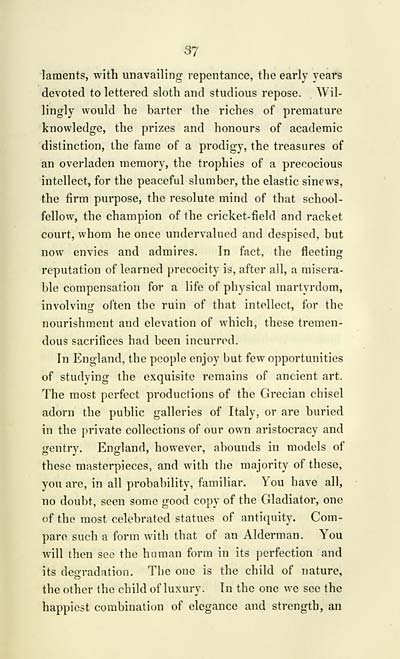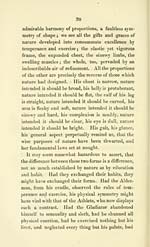J. F. Campbell Collection > Address to the middle classes upon the subject of gymnastic exercises
(43)
Download files
Complete book:
Individual page:
Thumbnail gallery: Grid view | List view

37
laments, with unavailing repentance, the early yeafs
devoted to lettered sloth and studious repose. Wil-
lingly would he barter the riches of premature
knowledge, the prizes and honours of academic
distinction, the fame of a prodigy, the treasures of
an overladen memory, the trophies of a precocious
intellect, for the peaceful slumber, the elastic sinews,
the firm purpose, the resolute mind of that school-
fellow, the champion of the cricket-field and racket
court, whom he once undervalued and despised, but
now envies and admires. In fact, the fleeting
reputation of learned precocity is, after all, a misera-
ble compensation for a life of physical martyrdom,
involving often the ruin of that intellect, for the
nourishment and elevation of w^hich, these tremen-
dous sacrifices had been incurred.
In England, the people enjoy but few opportunities
of studying the exquisite remains of ancient art.
The most perfect productions of the Grecian chisel
adorn the public galleries of Italy, or are buried
in the private collections of our own aristocracy and
gentry. England, however, abounds in models of
these masterpieces, and with the majority of these,
you are, in all probability, familiar. You have all,
no doubt, seen some good copy of the Gladiator, one
of the most celebrated statues of antiquity. Com-
pare such a form with that of an Alderman. You
will then see the human form in its perfection and
its degradation. The one is the child of nature,
the other the child of luxury. In the one we see the
happiest combination of elegance and strength, an
laments, with unavailing repentance, the early yeafs
devoted to lettered sloth and studious repose. Wil-
lingly would he barter the riches of premature
knowledge, the prizes and honours of academic
distinction, the fame of a prodigy, the treasures of
an overladen memory, the trophies of a precocious
intellect, for the peaceful slumber, the elastic sinews,
the firm purpose, the resolute mind of that school-
fellow, the champion of the cricket-field and racket
court, whom he once undervalued and despised, but
now envies and admires. In fact, the fleeting
reputation of learned precocity is, after all, a misera-
ble compensation for a life of physical martyrdom,
involving often the ruin of that intellect, for the
nourishment and elevation of w^hich, these tremen-
dous sacrifices had been incurred.
In England, the people enjoy but few opportunities
of studying the exquisite remains of ancient art.
The most perfect productions of the Grecian chisel
adorn the public galleries of Italy, or are buried
in the private collections of our own aristocracy and
gentry. England, however, abounds in models of
these masterpieces, and with the majority of these,
you are, in all probability, familiar. You have all,
no doubt, seen some good copy of the Gladiator, one
of the most celebrated statues of antiquity. Com-
pare such a form with that of an Alderman. You
will then see the human form in its perfection and
its degradation. The one is the child of nature,
the other the child of luxury. In the one we see the
happiest combination of elegance and strength, an
Set display mode to: Large image | Transcription
Images and transcriptions on this page, including medium image downloads, may be used under the Creative Commons Attribution 4.0 International Licence unless otherwise stated. ![]()
| Early Gaelic Book Collections > J. F. Campbell Collection > Address to the middle classes upon the subject of gymnastic exercises > (43) |
|---|
| Permanent URL | https://digital.nls.uk/78249604 |
|---|
| Description | Volumes from a collection of 610 books rich in Highland folklore, Ossianic literature and other Celtic subjects. Many of the books annotated by John Francis Campbell of Islay, who assembled the collection. |
|---|
| Description | Selected items from five 'Special and Named Printed Collections'. Includes books in Gaelic and other Celtic languages, works about the Gaels, their languages, literature, culture and history. |
|---|

